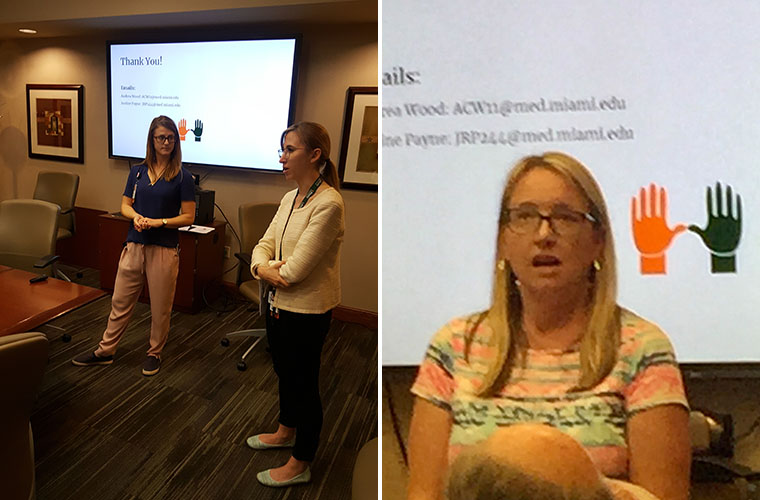6th Support Group Meeting

LEFT: Justin Payne and Andrea Ward | RIGHT: Beth Peters
We had three great speakers on Oct 23rd held at the University of Miami Hospital’s Board Room: Physical therapists Justine Payne, PT, DPT and Andrea Ward, PT, DPT, and Beth Peter, from Professional Safe n Simple.
Justine Payne and Andrea Wood are pelvic health physical therapists, both are Board Certified Women’s Health Physical Therapy Clinical Specialists (WCS) and both are Certified Pelvic Rehabilitation Practitioners (PRPC). Together they gave a great presentation that was received enthusiastically. They discussed "Pelvic Health and Hernia Prevention."
They explained what a hernia is, more specifically a parastomal hernia, the symptoms and risk factors for parastomal hernias and the basic prevention of hernias postoperatively. When they talked about the benefits of exercise to strengthen muscles, they demonstrated some basic exercises. They had everyone at the meeting participating and practicing the exercises. They recommend AVOIDING: (1) holding your breath, (2) heavy lifting over 5lbs, and (3) excessive repetitive crunching and/or twisting motions. They recommend to DO: Activities that encourage use of multiple muscle groups at once to increase core strength, like yoga, tai chi, or dance. Please see the exercise hand out below that everyone at the meeting received.
- SYMPTOMS: Prolapse, enlargement of stoma, leakage of contents of ostomy bag, poor fit of ostomy bag, Incarceration or strangulation of the bowel.
- RISK FACTORS: Advanced age, recurrent increases in abdominal pressure, obesity and/or weight gain after surgery, wound infection, malnutrition, glucocorticoids, malignancy, inflammatory bowel disease, immunosuppression, COPD/emphysema, and gender.
- BASIC PREVENTION OF HERNIAS POSTOPERATIVELY: Avoid heavy lifting for 3 months. Abdominal exercises should begin three months after surgery; however, light isometric transverse abdominis contractions can be performed. Exhaling with transition movements like sit-to-stand motion can help decrease daily intra-abdominal pressure. Learning a basic small squat with breath versus bending excessively to pick up Things. Proper transition out of bed: rolling first, exhaling and pushing up (their saying is "blow before you go!") and splinted coughing (putting pillow pressure on your abdomen when you cough).
After answering attendee’s questions, the next speaker was introduced by Rob Seaman.
Beth Peter, from Professional Safe n Simple, brought and passed around two different belts for hernias prevention that her company provides. They have belts with a stoma hole on either side. She said that belts for multiple stoma holes on each side can be special ordered. She advised that a prescription is needed if you are submitting to insurance. She also recommended that when you order supplies to get the maximum amount, even if you do not need them at the time, because you never know what emergency will arise. She then answered questions about her products.
Safe & Simple is known by the wound care community for their Peri-Stomal Cleanser and adhesive removers. They carry wipes and cleansers, in different packages. They passed around a catalog of other items and some samples. Most ostomates use their wipes and adhesive remover.
Refreshments were provided by the Miami Ostomy Aftercare Program, Inc.
Download Safe N Simple flyer